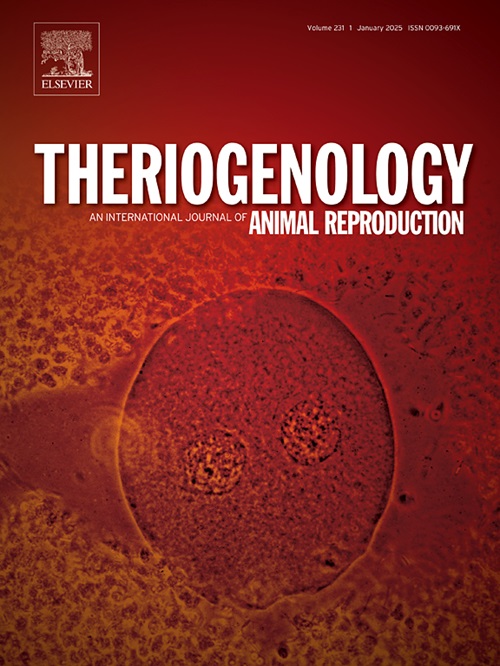Bromodomain and extraterminal domain (BET) promote autophagy in buffalo sertoli cells
IF 2.4
2区 农林科学
Q3 REPRODUCTIVE BIOLOGY
引用次数: 0
Abstract
Sertoli cells (SCs) play a pivotal role in spermatogenesis, with autophagy modulation being an evolutionarily conserved mechanism for maintaining cellular homeostasis and protecting spermatogenic cells against apoptosis. The bromodomain and extraterminal domain (BET) family are transcriptional regulators of autophagy. This study investigated the relationship between BET inhibition and autophagy in buffalo SCs. Our findings reveal that BET inhibition suppresses cell proliferation and alters the biological characteristics of SCs. RNA-seq analysis demonstrated significant downregulation of autophagy-related genes upon BET inhibition. Moreover, our bioinformatics analysis suggested the involvement of the PI3K-AKT signaling pathway in autophagy regulation within buffalo SCs. Immunofluorescence and Transmission electron microscopy observations indicated that BET inhibition results in autophagosome accumulation and impedes autophagosome-lysosome degradation, thereby compromising autophagy activity and flux. In summary, this study sheds light on the indispensable role of BET proteins in autophagy and paves the way for further investigations into the mechanisms governing BET protein-mediated autophagy regulation and its implications for male reproduction.
溴化多聚酶原(Bromodomain)和胞外多聚酶原(BET)可促进水牛性腺细胞的自噬。
塞尔托叶细胞(Sertoli cells,SCs)在精子发生过程中起着关键作用,自噬调节是维持细胞平衡和保护生精细胞免受凋亡的一种进化保守机制。溴化多聚酶域(bromodomain)和外基质酶域(extraterminal domain,BET)家族是自噬的转录调控因子。本研究探讨了水牛SC中BET抑制与自噬之间的关系。我们的研究结果表明,BET抑制可抑制细胞增殖并改变SCs的生物学特性。RNA-seq分析表明,BET抑制后自噬相关基因显著下调。此外,我们的生物信息学分析表明,PI3K-AKT 信号通路参与了水牛 SCs 的自噬调控。免疫荧光和透射电子显微镜观察表明,BET抑制会导致自噬体积累,阻碍自噬体-溶酶体降解,从而影响自噬活性和通量。总之,本研究揭示了 BET 蛋白在自噬中不可或缺的作用,为进一步研究 BET 蛋白介导的自噬调控机制及其对男性生殖的影响铺平了道路。
本文章由计算机程序翻译,如有差异,请以英文原文为准。
求助全文
约1分钟内获得全文
求助全文
来源期刊

Theriogenology
农林科学-生殖生物学
CiteScore
5.50
自引率
14.30%
发文量
387
审稿时长
72 days
期刊介绍:
Theriogenology provides an international forum for researchers, clinicians, and industry professionals in animal reproductive biology. This acclaimed journal publishes articles on a wide range of topics in reproductive and developmental biology, of domestic mammal, avian, and aquatic species as well as wild species which are the object of veterinary care in research or conservation programs.
 求助内容:
求助内容: 应助结果提醒方式:
应助结果提醒方式:


